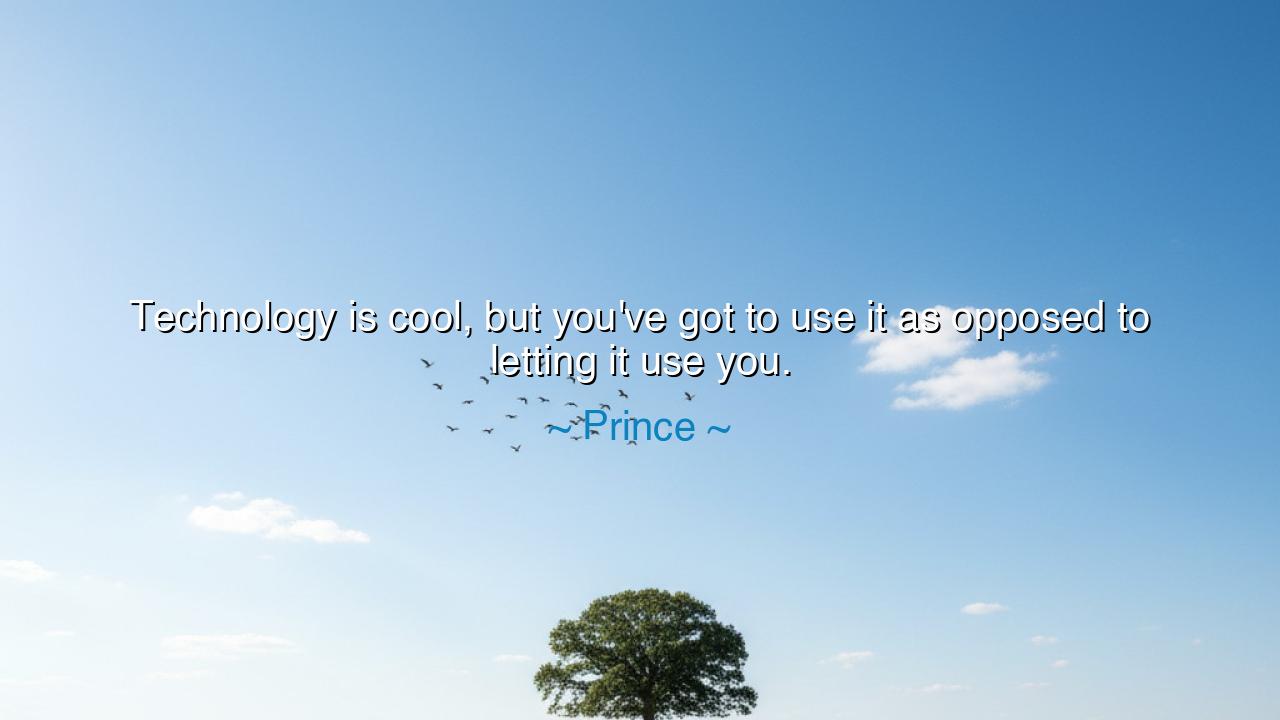
Technology is cool, but you've got to use it as opposed to






In the age of advancing technology, there are few truths more essential than the wisdom of knowing how to use technology rather than allowing it to consume us. The great Prince, a poet, a musician, and a visionary, once said, "Technology is cool, but you've got to use it as opposed to letting it use you." These words, spoken in the wake of a technological revolution, speak not only to the tools we create but also to the delicate balance we must maintain in how we interact with them. Technology, like fire, can be a powerful servant or a destructive master—it is our responsibility to decide which.
In the ancient world, wise sages spoke of the balance between progress and wisdom. They warned that, in the pursuit of innovation and knowledge, we must not become slaves to the very things we create. Just as the blacksmith masters the forge to shape iron into useful tools, so too must we master the technologies that shape our modern world. If we fail to control these tools, they will control us, and we will find ourselves adrift, driven by forces outside our control. The great minds of the past, from Aristotle to Confucius, understood this truth: true wisdom lies not in the accumulation of power or knowledge but in the careful management of it.
The tale of Icarus, who flew too close to the sun with wings made of wax and feathers, serves as a timeless reminder of the dangers of hubris. In his quest for transcendence, he failed to understand the limits of his creations, and in doing so, he fell from the sky. His tragedy is not just a warning about physical limits, but about the danger of overreliance on technology without the wisdom to guide its use. Icarus relied on the very technology he had crafted to soar, but it was his failure to respect the natural laws and limits that led to his downfall. The same lesson applies to our relationship with modern technology: we must embrace its power, but never forget the need for humility and awareness in how we wield it.
Consider the story of Nikola Tesla, a genius who gave humanity the gift of alternating current—a technology that powers our world today. Yet, despite his brilliance, Tesla found himself often at odds with the world around him, as his creations became larger than life. He dreamed of using technology to improve humanity, but in his later years, he grew increasingly isolated, losing touch with the very world he had sought to uplift. Tesla’s story is a reminder that while technology can expand the boundaries of what is possible, it is not enough to simply create—it is essential to maintain the balance and wisdom to use it consciously.
In the present day, we are surrounded by devices that shape our lives: smartphones, computers, and artificial intelligence. They are incredible tools, capable of doing things once thought impossible. But, as Prince wisely observed, these tools are only valuable if we are the ones in control. It is easy to become addicted to the constant stream of information, the endless notifications, and the pressure to keep up with the digital world. But as we become increasingly connected, we must ask ourselves: are we using these tools, or are they using us? Do we control our devices, or do they control our attention and focus? To live fully and meaningfully, we must maintain the power of choice in how we engage with technology.
The lesson of Prince’s words is one of empowerment. Technology, in all its glory, is a tool—a means to an end. The question is: what end do we seek? The ancients taught that the true measure of wisdom is not in the accumulation of resources or abilities but in the judicious use of them. Technology has the power to elevate our lives, but it requires our guidance to remain a servant and not a master. We must choose, each day, to be mindful in how we engage with the digital world, setting boundaries and using our tools to serve our higher purpose.
In our own lives, we can take practical steps to regain control over the technologies we interact with daily. Start by creating clear intentions for how and why you use technology—whether for work, learning, or leisure. Set boundaries for your digital consumption, just as you would set a boundary in any other relationship. Be intentional with your time, and carve out moments for stillness, where you are free from the constant pull of notifications and devices. Technology is powerful, but it is our awareness and wisdom that make it a force for good. Let us follow Prince’s advice and master the tools we create, ensuring they serve us, rather than the other way around.
So, remember the lesson passed down through the ages: technology is cool, but only when we are in command. As we stand at the threshold of a new era, let us honor the gift of progress with the wisdom to wield it consciously, and in doing so, ensure that our future remains in our hands. The tools we create can elevate us, but we must remain the masters, not the servants, of our own creations. Use technology with wisdom, and it will serve your highest purpose.






AAdministratorAdministrator
Welcome, honored guests. Please leave a comment, we will respond soon